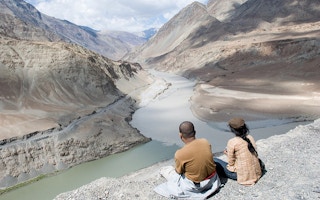As India reviews the Indus Water Treaty (IWT) that it signed with Pakistan in 1960, experts say any changes in the water-sharing agreement should consider the effects of climate change on the Indus River basin rather than political tensions between the rivalling South Asian neighbours.
Under the IWT which was mediated by the World Bank, Pakistan was allocated the waters of the Indus and its westward flowing tributaries, the Jhelum and Chenab, while India was given exclusive rights over the eastern tributaries of Ravi, Beas and Sutlej.
The Indus River rises in Tibet and flows northwest through the Himalayas before crossing into the Jammu and Kashmir regions and meandering through the Indian and Pakistani administered areas.
Around 39 per cent of the basin is in India and about 50 per cent is in Pakistan while the rest are in China and Afghanistan.
“
Societies around river basins must cope with the implications of climate change on water resources, and trans-boundary countries are better off tackling these issues collectively.
A. K. Gosain, professor of civil engineering, Indian Institute of Technology-Delhi
The treaty has been honoured through several territorial wars between the signatories. But a terrorist attack last 18 September on an army base at Uri near the “line-of-control”dividing Kashmir prompted India to order a review of the IWT that awarded 80 per cent of the Indus waters to Pakistan.
Experts say that whatever the ultimate fate of the IWT, it must take into account scientific studies showing serious changes to the water flow pattern of the Indus waters as a result of climate change — a phenomenon that was unheard of when the treaty was signed.
According to a paper published in Geocarto International in January, changes to glaciers in the Kashmir Himalayas that feed the Indus could have an adverse effect on stream flows, water supplies and other dependent sectors in the region.
The glaciers provide snowmelt to the Jhelum, one of the Indus tributaries whose waters are allocated exclusively for Pakistan’s use under the IWT.
Shakil Romshoo, an author of the paper, tells SciDev.Net that a revision of the IWT should be guided by scientific knowledge and take into account new issues such as climate change, environmental flows and other aspects that have significantly impacted water availability and distribution.
A. K. Gosain, professor of civil engineering at the Indian Institute of Technology-Delhi, also tells SciDev.Net that no water treaty can be static.
“Societies around river basins must cope with the implications of climate change on water resources, and trans-boundary countries are better off tackling these issues collectively,” Gosain says.
“As scientific knowledge becomes better, revisions may be needed and renegotiations may become inevitable.”
This piece was produced by SciDev.Net’s South-East Asia & Pacific desk.










